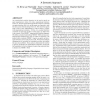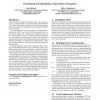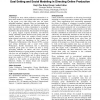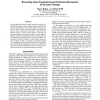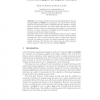866 search results - page 23 / 174 » A Formal Investigation of |
ATAL
2010
Springer
13 years 11 months ago
2010
Springer
An organizational modeling language can be used to specify an agent organization in terms of its roles, organizational structure, norms, etc. Such an organizational specification ...
CCS
2010
ACM
13 years 10 months ago
2010
ACM
A communication channel from an honest sender A to an honest receiver B can be described as a system with three interfaces labeled A, B, and E (the adversary), respectively, where...
CSCW
2012
ACM
12 years 5 months ago
2012
ACM
A challenge for many online production communities is to direct their members to accomplish tasks that are important to the group, even when these tasks may not match individual m...
FLAIRS
2008
14 years 4 days ago
2008
Typical application fields of spatial and spatio-temporal representation formalisms and reasoning techniques include geographic information systems (GIS), mobile assistance system...
IFL
2005
Springer
14 years 3 months ago
2005
Springer
In programs written in lazy functional languages such as for example Clean and Haskell, the programmer can choose freely whether particular subexpressions will be evaluated lazily ...
